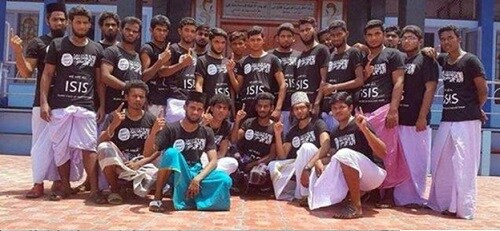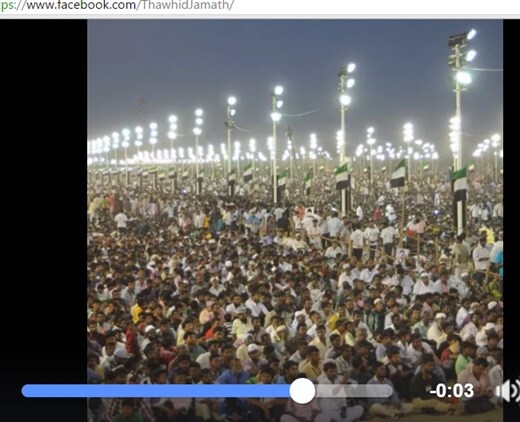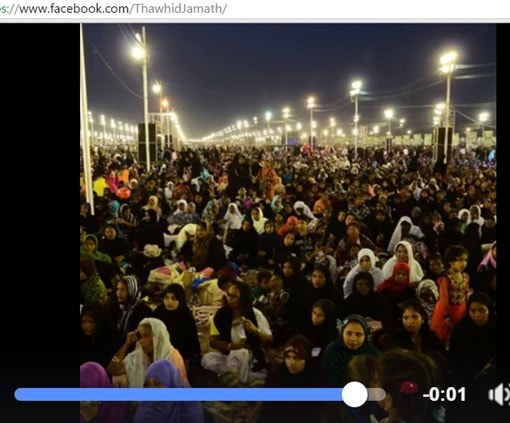On January 31, the Indian Islamist group All India Thowheed Jamaat (AITJ) held an "Anti-Shirk [i.e. polytheism] Conference" in the southern city of Tiruchy in Tamil Nadu state. The conference, calling for the abolition of all forms of shirk, was organized under the auspices of AITJ's local affiliate of Tamil Nadu Thowheed Jamaath (TNTJ), which is practically identical to the parent organization due to its predominant presence in the southern state of Tamil Nadu.
The AITJ was founded by the Islamist leader P. Jainulabudeen, who wields political influence in the state. The organization's main leaders for the Tamil Nadu branch are: P.M. Althafi, the state president; Abdul Rahman, the state secretary; and Mohammed Yusuf, the state general secretary.[1] The state branch apparently has another secretary: M.S. Sulaiman.[2]

A report on the anti-shirk conference in Roznama Rashtriya Sahara
The Hindu, a leftist daily read mainly in southern India, published a three-paragraph report titled "Muslims Urged To Shun Superstitions," arguing that the conference was simply against superstition.[3] The New Indian Express, another leading newspaper published in more than two dozen cities in southern India, carried a report titled "'Anti-Shirk' Meet Stirs Dargah Worship Debate."[4] Given that the proceedings of the conference were carried out in the Tamil language, and that non-Muslim journalists are generally not intellectually equipped to grasp the ideological meanings of Islamic concepts such as shirk, most newspapers have dismissed the gathering as a conference against "superstition" and "dargah" worship. Dargah means shrine, usually one for a Sufi mystic.
However, the Urdu daily Roznama Rashtriya Sahara described the conference as a "revolution," publishing a report titled "The Tawheed Revolution Crushes Obstacles [Under Its Feet]." A subheading in the report noted: "Islam cuts the root of shirk and encourages [adoption of] the belief of Tawheed and righteous deeds; the Ulema [Islamic scholars] address hundreds of thousands of Muslims in shirk-termination conference in Tiruchy, Tamil Nadu..."[5] (see image above).
Journalists, politicians, and intellectuals in India do not realize that it is because of the theological principle of anti-shirk ideology, practiced in this case by the TNTJ, that the Tehreek-e-Taliban Pakistan (TTP, or Movement of the Pakistani Taliban) has bombed many Sufi shrines in Pakistan in recent years. The Daata Durbar shrine in Lahore - perhaps the second most important Sufi shrine in South Asia after the Khwaja Gharib Nawaz shrine in the Indian town of Ajmer - was targeted by jihadi suicide bombers on July 1, 2010, in an attack that killed some three dozen and wounded 175 others.[6] While the TNTJ cannot bomb Sufi shrines in India as of yet, it is necessarily an organization that is ideologically indistinguishable from the Taliban, Al-Qaeda, and the Islamic State (ISIS).
At the very least, the TNTJ, or its parent organization the AITJ, is a precursor organization to ISIS. Theologically, the TNTJ stands for demolishing all idols - much like the Taliban demolished the Buddhas or ISIS demolishes human figures in Iraq and Syria. However, the TNTJ is at this time targeting only Barelvi-Sufi groups.
The concept of shirk is an important principle for all Islamic groups, especially the Deobandi groups. The anti-shirk conference in Tamil Nadu should be a cause of concern, because a 29-year-old man from this state, Mohammed Naser Packeer, was recently deported by Sudan after trying to enter Libya to join the Islamic State (ISIS).[7] There were also previous incidents in which young Singapore-based men from Tamil Nadu state joined ISIS in Syria. This should also cause concern because it was in the coastal town of Thondi in Ramanathapuram district of this same state that, in 2014, a group of 26 young Muslim men posed for a group photograph sporting black T-shirts with the ISIS logo in front of a mosque.[8]

26 Muslims pose in ISIS t-shirts at a mosque in Tamil Nadu state
The Concept Of Shirk And Sufi Shrines
The Arabic word shirk means partnership. In Islamic theology, shirk means associating a person with or attributes to Allah. Since India is home to millions of idols worshipped by Hindus, and thousands of Sufi shrines visited by large number of Muslims as well as Hindus, the TNTJ's theological principle of anti-shirk means opposing all forms of idolatry. Under this theological principle, even if a Hindu or non-Muslim believes that there is only one god, it does not automatically follow that he is not committing shirk. Such a person must accept that there is only one god, Allah, as explained by Indian Islamic televangelist Zakir Naik in a video speech.[9] Naik's view is no different from that of other Indian clerics, whether Deobandi or Barelvi.
It follows that a true believer in Islam must oppose all forms of shirk, and, when possible, remove all signs of it forcibly - a key reason that the Taliban bombed dargahs (Sufi shrines) in Pakistan. Under this theological principle, the TNTJ is no different from ISIS, albeit sans the practice. A January 31 post on the TNTJ's Facebook wall included a picture of crowds present at its Tiruchy conference and notes: "Lakhs [hundreds of thousands] of people proclaiming 'There is no God but Allah.'"[10] The phrase "There is no God but Allah" is the basic tenet of Islam. Nevertheless, it makes it clear that no deity other than Allah is acceptable. These words also appear on the flags of Saudi Arabia, ISIS, and the Taliban in Afghanistan and Pakistan. In Islamist conception, monotheism only means "Islamic monotheism" - i.e. Tawheed.
Across India and Pakistan, Deobandi clerics vehemently oppose dargahs. As per a February 2 post on the Facebook page of the AITJ's Hyderabad branch, an exhibition was held at the Tiruchy conference that showed models of dargahs (Sufi shrines) visited by a large number of Muslims and Hindus across India, presenting them as a form of shirk, i.e. idolatry or polytheism [11] Below are some of the photos from the Facebook post:

Models of dargahs at the Tiruchy conference

Models of dargahs X'ed out

The model on the left, with fire at the door, shows that entering a dargah means entering Hell; the model on the right with green plants is the place of One God (Tawheed)
SUPPORT OUR WORK

The following images were posted by the TNTJ on its Facebook page on January 31.[12] In these images actors explain how dargahs function to promote shirk across South Asia:



Photos Of The Audiences At The Anti-Shirk Conference
The anti-shirk conference's focus was on theological issues, but it is clear that the organization is also seeking to impact political issues in India. According to a newspaper report, "the focus of the debate was on the concept of Dargah worship, this being against Islam[ic] ideology, as [the] Koran does not encourage such worship, claimed debaters. Nineteen resolutions were passed on various religious and political aspects, with an emphasis on certain decisions such as 'worship only Allah,' 'do not believe in black magic,' and 'do not believe anyone as equal to the Almighty.' Urging the Centre [i.e. the federal Indian government] and the State governments to implement Muslim reservation [i.e. reserving places for Muslims in jobs and educational institutions] was also discussed."[13]
The Indian media has ignored the anti-shirk conference in Tiruchy as if it were a minor event. However, photos and videos available on websites and social media platforms associated with the TNTJ indicate that it was a sizeable conference. Following are photos shedding light on the thinking behind the Tiruchy conference and its influence on the masses:

A man who, along with his family, converted to Islam at the Tiruchy conference

A view of the crowds at the Tiruchy conference

A poster on the Tiruchy conference issued by ATTJ emphasizes Islamic monotheism

A family converted to Islam by AITJ

A large number of women attended the conference

TNTJ volunteers distributing water at the conference

A view of the crowd at the anti-shirk conference
* Tufail Ahmad is Director of MEMRI's South Asia Studies Project
Endnotes:
[1] The New Indian Express (India), February 1, 2016.
[2] The Hindu (India), February 1, 2016.
[3] The Hindu (India), February 1, 2016.
[4] The New Indian Express (India), February 1, 2016.
[5] Facebook.com/ThowheedJamaath.Hyd, February 5, 2016.
[6] The Express Tribune (India), July 2, 2010.
[7] The New Indian Express (India), December 12, 2015.
[8] TheHindu.com (India), August 4, 2014.
[9] Youtube.com/watch?v=eppNI_EnPso, accessed February 8, 2016.
[10] Facebook.com/ThawhidJamath, accessed February 7, 2016.
[11] Facebook.com/ThowheedJamaath.Hyd, accessed February 7, 2016.
[12] Facebook.com/ThawhidJamath, January 31, 2016.
[13] The New Indian Express (India), February 1, 2016.




